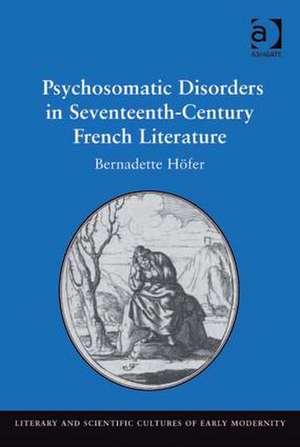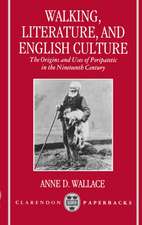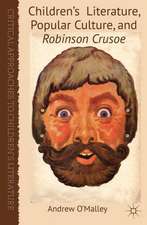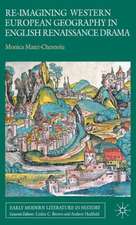Psychosomatic Disorders in Seventeenth-Century French Literature
Autor Bernadette Höferen Limba Engleză Hardback – 28 sep 2009
Preț: 787.65 lei
Preț vechi: 829.10 lei
-5% Nou
Puncte Express: 1181
Preț estimativ în valută:
150.71€ • 157.78$ • 124.71£
150.71€ • 157.78$ • 124.71£
Carte tipărită la comandă
Livrare economică 07-21 aprilie
Preluare comenzi: 021 569.72.76
Specificații
ISBN-13: 9780754666219
ISBN-10: 0754666212
Pagini: 260
Dimensiuni: 156 x 234 x 16 mm
Greutate: 0.64 kg
Ediția:1
Editura: Taylor & Francis
Colecția Routledge
Locul publicării:Oxford, United Kingdom
ISBN-10: 0754666212
Pagini: 260
Dimensiuni: 156 x 234 x 16 mm
Greutate: 0.64 kg
Ediția:1
Editura: Taylor & Francis
Colecția Routledge
Locul publicării:Oxford, United Kingdom
Recenzii
'Professor Höfer's new book represents an excellent piece of scholarship that is innovative, incisive, and very well written. The blending of scientific, philosophical, and literary perspectives is truly interdisciplinary in its approach and yields a great number of original interpretations essential to understanding key early modern French texts. Similarly, the agility with which the author moves from early modern to modern and contemporary thought is another sterling feature of her research. Without question, Professor Höfer is to be commended on such an ambitious and valuable project.' Russell Ganim, University of Nebraska-Lincoln, USA ’... this ambitious book is a thought-provoking and long-overdue consideration of the Cartesian mind-body split and seventeenth-century literary reactions. Despite our modern recognition that Descartes split the mind and body, there has been relatively little discussion of what that actually meant for people’s understanding of the body in the seventeenth century. As Höfer shows, Descartes’ philosophy was not straightforward, even to himself, and there were many competing ideas about the mind-body relationship. This book will contribute significantly to scholarship on the history of the body, which has long neglected to explore subjective bodily experience.’ British Society for Literature and Science ’Höfer’s book will certainly provide nourishment for those who share her interests. One closes it with unstinting admiration for the (almost) invisible translator.’ French Studies 'This is an exceptionally rich and well-researched study that crosses generic boundaries in an enlightening and convincing way. It will be an important point of reference for historians of medicine, culture, literature and philosophy.' Social History of Medicine
Notă biografică
Bernadette Höfer is an Assistant Professor of French at The Ohio State University, USA.
Cuprins
List of Figures, Acknowledgments, Note on Translations, Introduction, 1 The Relational Conception of Mind and Body in the Seventeenth Century, 2 Possession, Exorcism, and Madness: The Context of Jean-Joseph Surin’s Illness, 3 Melancholic Subversions in Molière’s Le misanthrope (1666) and Le malade imaginaire (1673), 4 Psychosomatic Fiction in Madame de Lafayette: The Enigma of Illness, 5 The Theater of Melancholy: Jean Racine’s Phèdre (1677), Conclusion, Works Cited, Index
Descriere
In this innovative and ambitious study, Bernadette Höfer explores how Surin, Molière, Lafayette, and Racine reverse the Cartesian conception of the dominance of the rational and propose instead a dramatic interconnection of body and mind. The author analyzes early modern medical and philosophical treatises, as well as contemporary medical compilations, to demonstrate that these seventeenth-century French writers fully anticipated current thought regarding psychosomatic illness.















